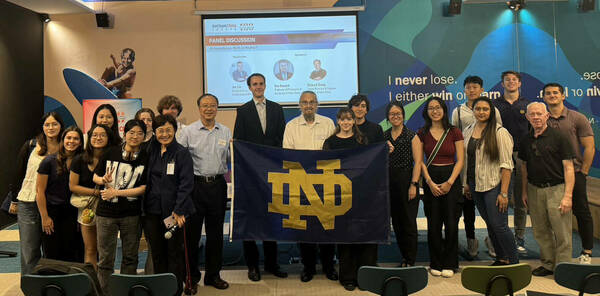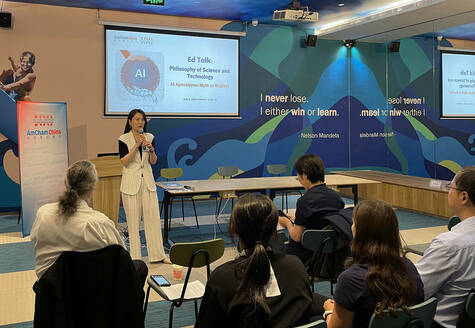

On July 3, 2024, American Chamber of Commerce in China (AmCham China), in collaboration with Notre Dame Beijing, hosted an AI ethics panel at their Chaoyang office in Beijing.
AmCham China is a non-profit, non-governmental organization representing nearly 1,000 U.S. companies operating in China, including Boeing, Microsoft, and Amazon. Its mission is to help American businesses succeed in China through advocacy, networking, insights, and business support services. The University of Notre Dame joined AmCham China as a member 10 years ago, and in 2023, Jingyu Wang, Executive Director of Notre Dame Beijing, was invited to serve as the co-chair of the Education Committee by AmCham China.
Panelists at the event included Professor Don Howard from the University of Notre Dame and Richard Zhang, Chief Technology Officer and Senior Principal AI Engineer at Intel China. Howard is known for his work on the philosophy of physics and the history of philosophy of science, while Zhang is deeply involved in advancing artificial intelligence (AI) and Internet of Things (IoT) technologies. Zhang’s work focuses on leveraging AI to enhance various applications, including retail digitalization, and using AI to improve business operations, drive revenue growth, and gain insights into consumer preferences. The event was moderated by Jim Lin, Social Lead of Brand and Communications at IBM China.
There were about 50 participants at the event, including students and alumni from the University of Notre Dame, AmCham China members, Peking University students, and students from other international high schools.
The event began with Wang and Clair Ma, Vice President of AmCham China, emphasizing the necessity of educational initiatives to bridge the gap between Chinese and American perspectives on AI. Wang underscored the role of academic collaboration in fostering mutual understanding and advancing technological progress, and Howard reflected on the launch of Notre Dame-IBM’s Tech Ethics Lab, a partnership funded by a 10-year, $20 million IBM commitment — noting that he “was grateful for this intersection between industry and academia.”
With the release of ChatGPT, discussions on AI ethics have intensified. Howard noted that prominent leaders in tech have issued warnings about AI’s existential threat, comparing it to nuclear weapons. However, Howard disagrees with this view, arguing that it distracts from more immediate issues and that we do not have enough information about AI to substantiate this claim.

“We do not know what the long-term or near-term development of AI will look like. We can make obvious guesses, but we don’t know what our future will look like in the coming decades. We have lived with nuclear weapons since the 1940s and we have great knowledge about them. We have decades of experience with how they work and with the global politics of how to manage them. We understand them with great nuance, unlike with AI. With this being the case, we do not have enough information to argue that AI poses an existential threat to humanity”.
Howard continued, “The notion of AGI (artificial general intelligence) is poorly defined. While generative AI is a step towards AGI, the fundamental question of ‘What is intelligence?’ remains unanswered. As philosophers, we have debated this for years. Intelligence encompasses cognitive, emotional, and social dimensions, making it premature to claim we are nearing AGI.”
Next, Zhang shed light on Intel’s ongoing work with AI infrastructure and its potential to enhance human lives. For example, he described how AI can revolutionize communication for the deaf and blind. “While we might believe that we cannot communicate with someone who is deaf or blind, we can use machines with AI capabilities to communicate. By translating hand movements into spoken words, we can enable seamless interaction.” In addition to improving accessibility, Zhang discussed how AI could cure something more intangible: loneliness.
“In China, there is a term known as ‘empty nest’ which refers to when children go to university and leave their parents’ household,” he shared. “There is a possibility for AI robots to provide companionship and communication for elderly parents whose children have moved away, by inputting ourselves into robots which will mimic our personalities.”
Zhang also explored how AI can democratize access to legal advice by using large language models to provide responses based on public data, making legal services more affordable. “Law services are very expensive, with many people feeling they cannot pay legal fees. Instead, we can ask questions to large language models that are trained using public data but do not have public domains. Through combining rad and public domain databases, the language model will search for keywords then produce a domain and language result.”
Zhang concluded with a hopeful vision for the future of AI development, “As a family of the Earth, we should look to use AI in a positive way to benefit us all.”
The event united two leading minds in AI industry and academia, allowing for a nuanced and diverse discussion on AI ethics. Howard brought a philosophical and theoretical approach to the topic, and Zhang’s industry perspective was grounded in pragmatism, practical implications of AI, and real-world developments. This synergy of insights allowed for a well-rounded and comprehensive discussion of the ethical frameworks surrounding AI.
Learn more about ND Beijing partnerships here.
Originally published by at beijing.nd.edu on July 26, 2024.